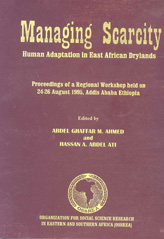Women In Agriculture & Rural Livelihoods
Women, Coffee and Climate
Modern Day Slavery
P/CVE Project
Migrating out of Poverty - Ethiopia
ELLA Project

List of Tables
Figures
Introduction
Abdel Ghaffar M. Ahmed and Hassan A. Abdel Ati
Human Adaptation in East African Drylands: The Dilemma of Concepts and Approaches
Leif Manger
From Adaptation to Marginalization: The Political Ecology of Subsistence Crisis Among the Hadendawa Pastoralists of Eastern Sudan
Orner Abdalla Egeirni
External Pressures on Indigenous Resource Management Systems:A Case From the Red Sea Area, Eastern Sudan
Hassan A. Abdel Ati
Agriculture and Pastoralism in Karamoja: Competing or Complementary Forms of Resource Use?.
Frank Emmanuel Muhereza
Management of Aridity: Water Conservation and Procurement in Dar Hamar, Western Sudan
Mustafa Babiker
Subsistence Economy, Environmental Awareness and Resource Management in Um Kaddada Province, Northern Darfur State
Munzoul Abdalla Munzoul
Economic Strategies of Diversification Among the Sedentary 'afar of Wahdes, North Eastern Ethiopia
Assefa Tewodros
Management of Scarce Resources: Dryland Pastoralism Among the Zaghawa of Chad and the Crisis of the Eighties
Sharif Harir
Resource Management in the Eritrean Drylands: Case Studies From the Central Highlands and Eastern Lowlands
Mohamed Kheir, Adugna Haile and Wolde-Amlak Araia
Survival Strategies in the Ethiopian Drylands: The Case of the Afar Pastoralists of the Awash Valley
Ali Said Yesuf
State Policy and Pastoral Production Systems: The Integrated Land Use Plan of Rawashda Forest, Eastern Sudan
Salah El Shazali Ibrahim
The Importance of Forest Resource Management Ii in Eastern Sudan: The Case of EI Rawashda and s Wad Kabo Forest Reserves
Sanaa Ibrahim Gadalla
Land Tenure and Pastoral Planning in the Red Sea Hills
Leif Manger
Range Management in the Sudan: An Overview of the Role of the
Abdel Rahman Abbakar Ibrahim
What If the Pastoralists Chose not to be Pastoralists?The Pursuit of Education and Settled Life by the Hadendawa of the Red Sea Hills, Sudan
Idris Salim EI-Hassan
Property and Social Relations in Turkana, Kenya
Prode Storas
"Do Give Us Children": The Problem of Fertility Among the Pastoral Barbayiig of Tanzania
Astrid Blystad
Abstract:
Compilation of papers presented at a regional workshop on adaptive strategies, coping mechanisms and survival strategies of pastoralists and agro-pastoralists who inhabit the drylands of East Africa to the harsh environment as well as internal disturbances and external pressures that they face. These papers address issues such as whether the common characteristics and trends seen among these pastoralists warrant common approaches and methods of research to allow a comparative view and, consequently, generalization about the whole region; conditions influencing the process of change in pastoralism and factors behind it; internal dynamics of the reproduction of the pastoral society and its property; complementarity of pastoralism and agriculture; and access to political power by pastoralists and its beneficial effects. The major conclusions of the deliberations are: drought is a recurrent reality to which pastoralists have developed various forms and means of adaptation; indigenous techniques and coping mechanisms have been developed in the process of adaptation and there is a need to reconsider the value of, and possibly develop techniques based on these indigenous knowledge; the process of change among pastoralists is not only a function of local physical conditions (e.g., range status, quality of animals, drought, etc.) but also a result of their interaction with and/or encroachment by external systems; and there are common trends of change in pastoral communities whose main features include the shift from large to small stock, change from nomadic migration to transhumance mobility, and engagement in other activities as secondary income sources, as short term survival strategies or as means of temporary adaptation while combining pastoralism with sedentary agriculture or total departure from pastoralism by means of education or joining the urban labour market are adopted as long, mechanisms of adaptation. The papers are titled: "Human adaptation in East African drylands: The dilemma of concepts and approaches", "From adaptation to marginalization: The political ecology of subsistence crisis among the Hadendawa pastoralists of eastern Sudan", "External pressures on indigenous resource management systems: a case from the Red Sea area, eastern Swan", "Agriculture and pastoralism in Karamoja: Competing or complementary forms of resource use", "Management of aridity: Water conservation and procurement in Dar Hamar, western Sudan", "Subsistence economy, environmental awareness and resource management in Um Kaddad province, Northern Darfur state", "Economic strategies of diversification among the sedentary Afar of Wahdes, north' eastern Ethiopia", "Management of scarce resources: Dryland pastoralism among the Zaghwa of Chad and the crisis of the Eighties", "Resource management in the Eritrean drylands: Case studies from the central highlands and eastern lowlands", "Survival strategies in the Ethiopian drylands: The case of the Afar pastoralists of the Awash valley", "State policy and pastoral production systems: The integrated land use plan of Rawashda Forest, eastern Sudan", "The importance of forest resources management in eastern Sudan: The case of EI Rawashda and Wad Kabo forest reserves", "Land tenure and pastoral planning in the Red Sea Hills", "Range management in the Sudan: An overview of the role of the State", "What if the pastoralists chose not to be pastoralists? The pursuit of education and settled life by the Hadendawa of the Red Sea Hills, Sudan", "Property and social relations in Turkana", and "'Do give us children': The problem of fertility among the pastoral Barbayiig of Tanzania"

